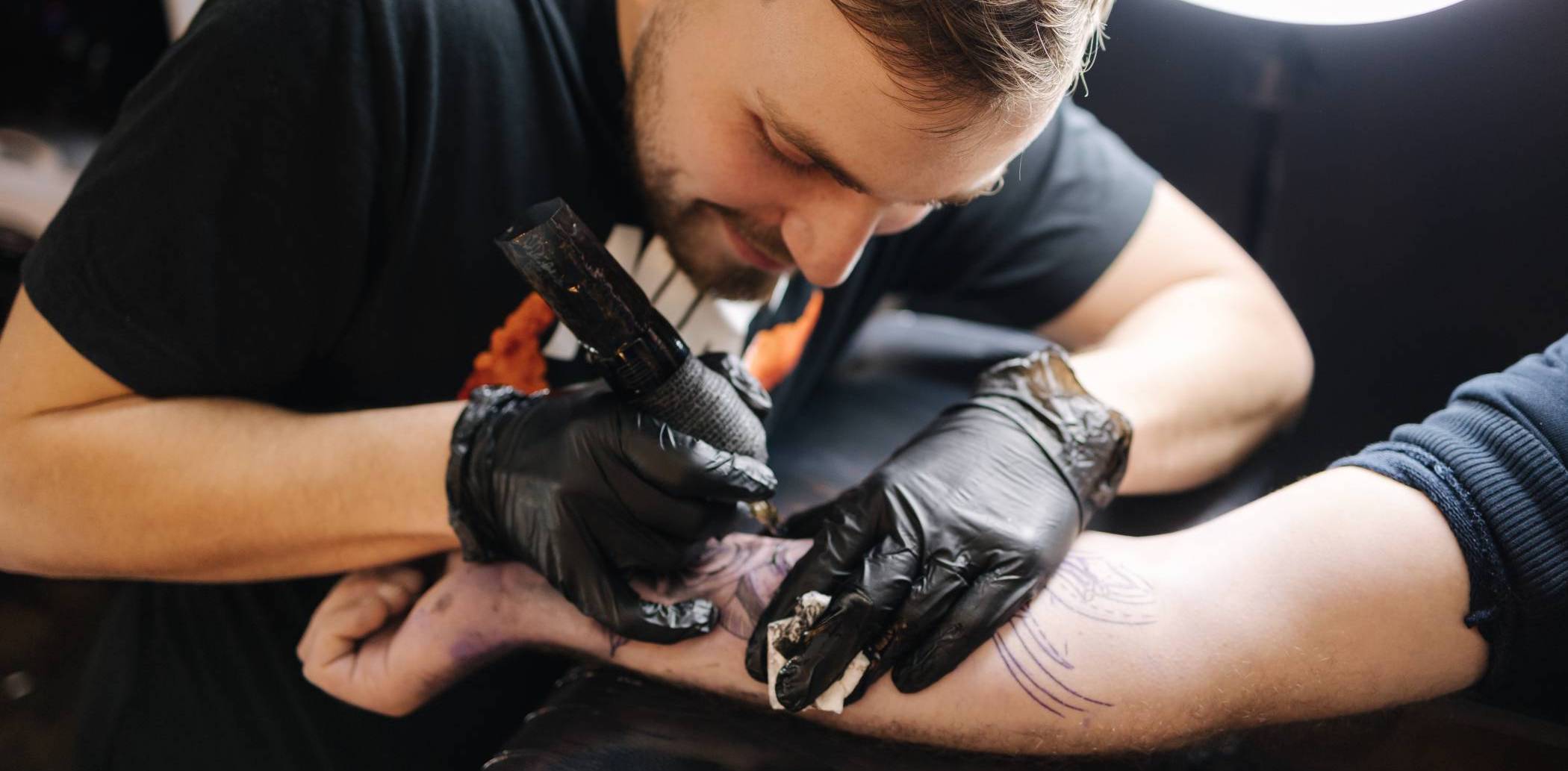- Home/
- Costs/
- Ear Piercing/
- Ear Piercing Cost Guide

How much does ear piercing cost in the UK?
Get a free quote nowPost to find a price. It's free and only takes a minute.
Average costs of ear piercing
£20 - £70
low
£20
median
£45
high
£70
Last Updated on

Written by Angela A.
Staff Writer
Read more about our contributor
Key Facts
Ear piercing can cost £20 to £70 in the UK on average, but final prices may vary based on the type, location, and other factors.
Nickel-based jewellery is often less expensive upfront, but its higher risk of allergic reactions and skin irritations can lead to additional costs for medical treatment and replacement jewellery.
- Don’t let your freshly pierced ear/s dry out. Use piercing ointments or balms to keep your skin hydrated.
So you’ve decided to get your ears pierced? But before you take the plunge, you ought to know the cost of ear piercing. This matters because even though the average is £20 to £70, prices can change based on your location, type of piercing, and many other factors.
In this guide, we’ll explain everything that influences ear piercing cost. Expect a detailed explanation, and by the end, you’ll be fully prepared for your next piercing adventure.
What are the average costs of ear piercings in the UK?
Curious about how much do ear piercings cost in the UK? Let’s quickly examine the average prices for various types of ear piercings, from simple lobes to intricate cartilage piercings.
Type of ear piercing |
Average cost |
|---|---|
Earlobe (Single) |
£20 to £35 |
Earlobe (Pair) |
£35 to £60 |
Cartilage |
£30 to £50 |
Conch |
£35 to £60 |
Daith |
£40 to £65 |
Helix |
£30 to £50 |
Forward Helix |
£35 to £55 |
Industrial |
£45 to £70 |
Orbital |
£35 to £55 |
Rook |
£35 to £60 |
Snug |
£40 to £65 |
Tragus |
£30 to £55 |
The average ear piercing cost in the UK typically ranges from £28 to $60 for standard earlobe piercings, depending on whether you get one or both ears pierced. Cartilage piercings are more intricate procedures, so they tend to be more expensive at £30 to £50.
The cost for a basic earlobe piercing starts at around £20 and can go up to £35 per lobe. Some studios offer discounts for pairs, but you can typically get both ears pierced for £35 to £60.
As mentioned earlier, you can have your ear cartilage pierced. A snug piercing costs £40 to £65, while a rook piercing ranges from £35 to £60.
But more complex piercings like conch and tragus go from £35 to £60 and £30 to £55, respectively. While, industrial piercings, which involve two holes connected by a barbell, cost between £45 and £70, largely because they require more skill.
There’s also the daith piercing, which you can get for £40 to £65 per service. You can even get a helix or forward helix for £30 to £55.
What types of ear piercings are available?
Estimating how much ear piercing is in the UK often depends on the difficulty level of the piercing. Want to know how much does a helix piercing cost or how expensive a conch piercing will be? Here’s a quick breakdown of the average prices for some of the most popular ear piercing options.
Earlobe piercing (Single or pair)
 A woman putting on earlobe earrings (Source: iStock)
A woman putting on earlobe earrings (Source: iStock)
This is the most common type of ear piercing, usually done on the soft tissue of the earlobe. It’s ideal for studs, rings, or small hoops. Single earlobe piercing cost ranges from £20 to £35. If you’re going for both earlobes, piercing costs £35 to £60.
Cartilage piercing
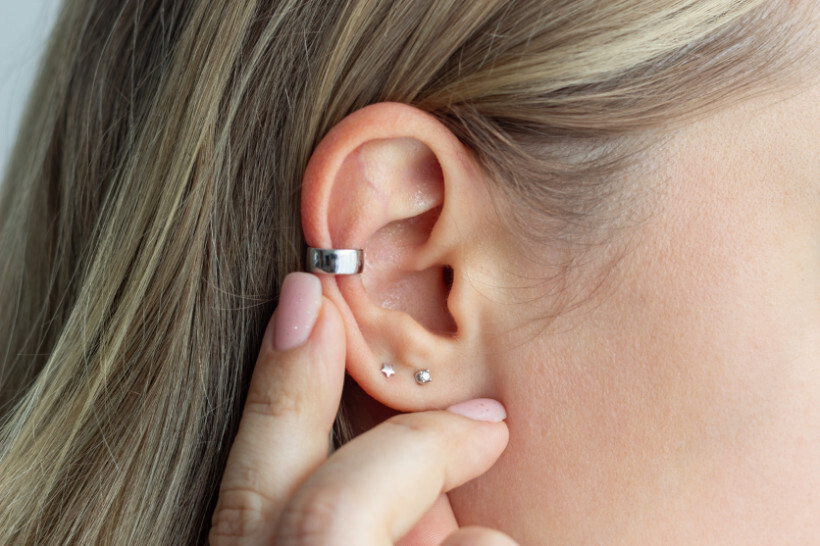 A woman touching her cartilage ear piercing (Source: iStock)
A woman touching her cartilage ear piercing (Source: iStock)
This is performed on the ear's upper cartilage, typically along the outer rim. Due to the tougher tissue, this piercing requires more skill than a lobe piercing. When inquiring about how much is a cartilage piercing, expect a response of around £30 to £50.
Helix piercing
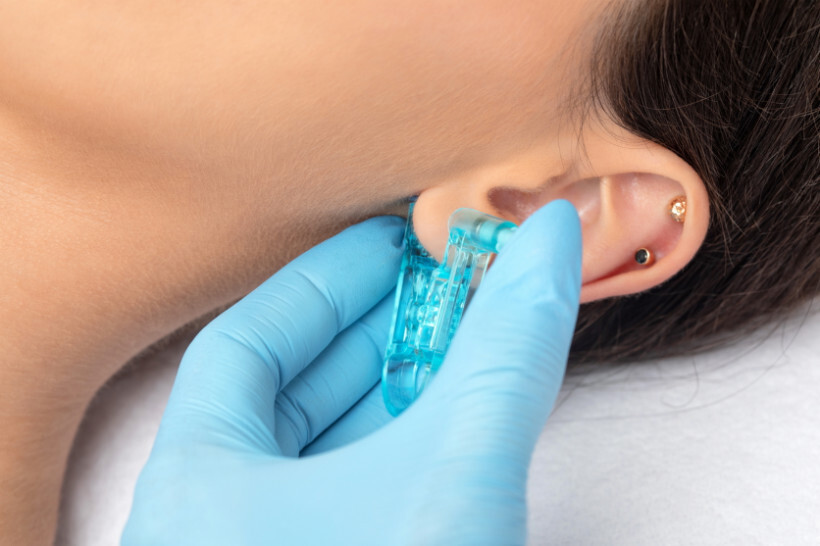 New helix ear piercing done professionally (Source: iStock)
New helix ear piercing done professionally (Source: iStock)
These piercings are mostly added along the helix, the upper outer edge of the ear. The helix ear piercing cost ranges from £30 to £50.
Forward helix piercing
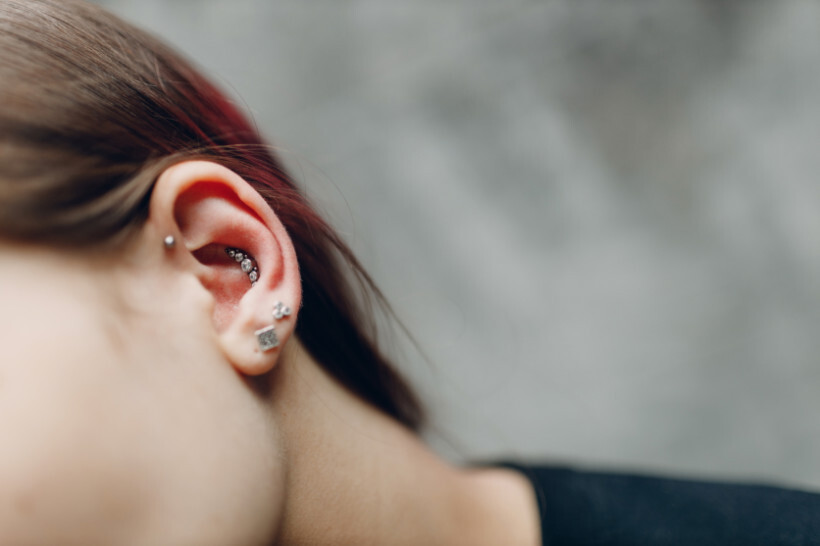 A woman with forward helix ear piercing (Source: iStock)
A woman with forward helix ear piercing (Source: iStock)
This is a type of helix piercing done on the front edge of the ear, hence the term “forward.” Since they’re closer to the face, forward helix piercings are slightly more delicate and typically cost between £35 and £55.
Conch piercing
Since it’s done in the middle part of the ear’s cartilage, this piercing resembles the shape of a conch shell. You can expect to pay between £35 and £60 for a conch piercing.
Industrial piercing
The industrial piercing is named for its unique style—two separate piercings are connected by a single straight barbell, giving it a bold, “industrial” look. The cost to get an industrial piercing usually falls between £45 and £70.
Daith piercing
Daith piercings are considered by many to be a bold look because they involve piercing the inner cartilage fold across the upper ear. This unique placement is believed to impact pressure points and treat migraines, but there’s no medical proof of this. It costs £40 to £65 to pull off.
Orbital piercing
Like industrial piercings, orbitals use two piercings. This piercing is called ‘orbital’ because the two holes are linked by a single ring, making it appear as though the jewellery is orbiting the ear. Getting an orbital piercing ranges from £35 to £55.
Rook piercing
A rook piercing is vertical and runs through the fold of the cartilage in the upper inner ear. This part is called the “rook.” A rook piercing service costs £35 to £60.
Snug piercing
This is considered one of the most painful ear piercings because it’s done horizontally through the inner cartilage. Its name stems from its tight placement and “snug” fit. It’ll usually set you back £40 to £65.
Tragus piercing
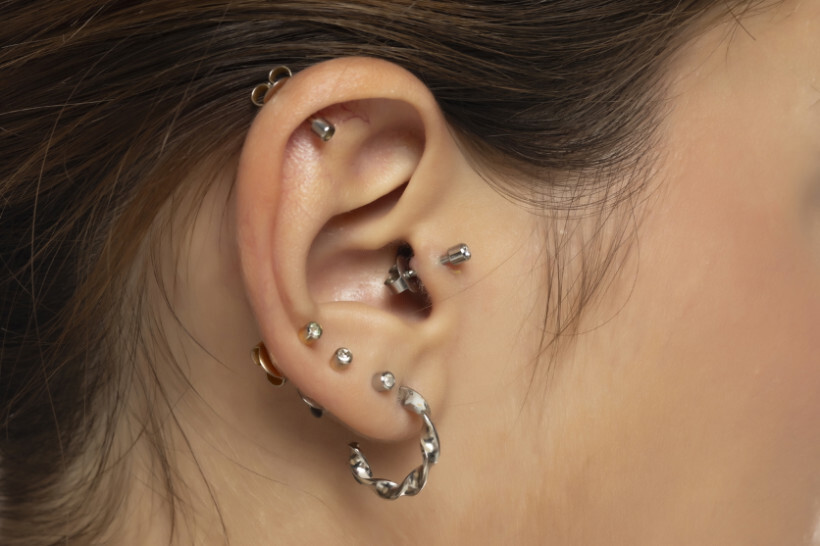 A woman with tragus ear piercings (Source: iStock)
A woman with tragus ear piercings (Source: iStock)
The tragus is the small, rounded piece of cartilage that sits just outside the ear canal. This piercing is done on that part of the ear. Tragus ear piercing costs will fall between £30 and £55.
What factors affect the cost of ear piercing?
What makes one ear piercing pricier than another? Here are a few factors influencing ear piercing cost in the UK, so you can budget accordingly.
Piercing technique
 A woman smiling as her ear is getting pierced (Source: iStock)
A woman smiling as her ear is getting pierced (Source: iStock)
The method used for piercing plays a big role in ear piercing prices. Piercing guns are often cheaper since they’re commonly used at mall kiosks and require basic training. However, they’re less precise and can’t be fully sterilised, so there could be an increased risk of infection.
On the other hand, piercing needles are more expensive but are considered a professional choice. They offer a cleaner puncture, which reduces tissue damage and potential complications. The higher cost is mainly due to the need for a trained piercer to use them and strict hygiene standards.
So, if you’re deciding between the two, remember that needles are generally safer, especially for cartilage and more intricate piercings. Paying more for the right technique is worth it if it means getting a safer experience and procedure.
Piercer’s experience
 A woman smiles during an ear piercing session (Source: iStock)
A woman smiles during an ear piercing session (Source: iStock)
The skill level of your piercer also impacts the average price for ear piercing. A highly trained professional, often found in tattoo or piercing studios, typically charges more due to their expertise and training.
Their experience means a safer procedure and personalised advice on placement and aftercare. You get a smoother and less painful process, too.
Plus, many piercers are trained in body modifications beyond the ear, like facial or belly piercings. Some are even tattoo artists as well.
That’s why it’s worth researching to find a well-reviewed piercer who performs piercings. You might pay more, but the quality of work and lower risk of complications are guaranteed.
Extra or upgraded jewellery
| Extra jewellery |
Estimated prices |
|---|---|
| Basic surgical steel jewellery | £10 to £25 |
| Titanium jewellery | £25 to £45 |
| Gold jewellery (14k or higher) | £50 to £120 |
| Platinum jewellery | £150 to £250 |
| Custom or designer jewellery (with gems or precious stones) | £100 to £300+ |
Planned or not, it’s worth bringing extra cash if you decide to pick up a quality earring you can use once your new piercing heals.
Basic jewelry, like surgical steel studs, is usually included in the base cost to get ears pierced. Separately, they tend to be priced at £10 to £25 per pair. However, if you upgrade to titanium, gold, or even platinum, the price can jump from £25 to £250.
Titanium and gold are popular upgrades, especially for those with metal allergies or sensitive skin. These materials are hypoallergenic and safer for healing but come at a higher cost—typically between £25 and £120.
Custom or designer pieces, particularly those with gemstones, can add an extra luxurious touch but can also increase the final cost, sometimes up to £300 or more.
Aftercare products
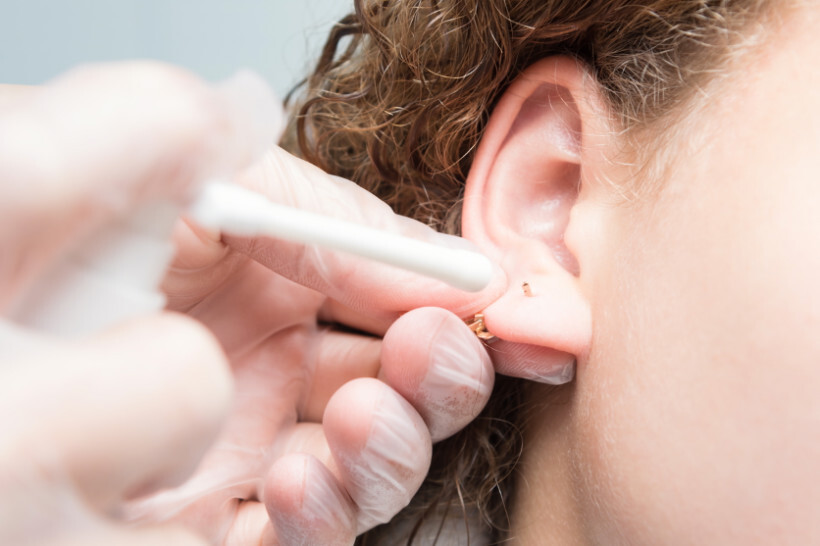 Careful cleaning of a new ear piercing (Source: iStock)
Careful cleaning of a new ear piercing (Source: iStock)
When figuring out how much getting your ears pierced costs, remember to factor in aftercare products to your budget. They’re essential for preventing infections and complications.
Sterile saline sprays usually cost between £5 and £15, and antimicrobial cleaning solutions range from £10 to £20. Both of these products help keep your piercing free from harmful bacteria and promote faster healing.
Some studios also offer complete aftercare kits with saline solution, wipes, and other accessories for £15 to £30. Piercing ointments or balms might also be recommended to soothe the area and keep it moisturised, costing around £8 to £18.
Jewellery shop vs piercing/tattoo studio

A successful ear piercing session (Source: iStock)
The type of establishment where you decide to get your piercing also impacts the cost and quality of the service. Jewellery shops or mall kiosks often use piercing guns and offer basic earrings. These places are usually cheaper but might not adhere to the same strict hygiene standards or expertise as professional studios.
Piercing or tattoo studios, on the other hand, specialise in body modification and use sterilised needles for a safer experience. These studios typically charge more because they employ trained professionals and maintain strict cleanliness standards.
So, expect to pay more in a tattoo studio than in a jewellery shop. This is because they can provide a broader range of piercing types and premium jewellery options. While mall kiosks are suitable for simple lobe piercings, tattoo studios are better for complex options like cartilage or industrial piercings
Piercing studio location and popularity
| Popular piercing studios/tattoo shops |
Average costs of ear piercing |
|---|---|
| Maria Tash |
£20 to £100+ |
| Tattoo 13 |
£35 to £80 |
| House of Iris |
£25 to £70 |
| Brighton Ear Piercing Centre |
£30 to £75 |
The location and popularity of ear piercing places can greatly affect how much you pay. Studios in upscale areas or trendy neighbourhoods often charge more due to higher overhead costs and increased demand. Well-known studios with celebrity clients or a strong online presence may also set premium rates simply because of their name and reputation.
If you’re in a big city like London, you can also expect to pay more at popular studios that offer a complete experience with professional piercers and high standards of cleanliness. Many of these studios also work alongside tattoo artists, so they can also offer body modification services.
On the other hand, lesser-known or private studios, especially in smaller towns, usually charge less. No worries, though. Researching local studios can help you find an affordable yet reputable place for your piercing. Even independent studios can offer high-quality services if they prioritise professionalism and hygiene.
How do you choose a reputable piercing studio?
Choosing the right piercing studio is crucial for your safety and also directly impacts how much is it to pierce ears. Unlike getting your hair styled or polishing your nails, ear and body piercing services involve breaking the skin, so cleanliness and professional expertise are a must. Here’s a step-by-step guide to help you decide:
Look for cleanliness and hygiene standards. The studio should be spotless, with visible sanitation practices like disposable gloves, sterilised tools, and clean surfaces. Make sure the studio looks and smells clean and that the piercer washes their hands and changes gloves between clients.
Check the piercer’s experience and qualifications. An experienced piercer should have proper training and a solid understanding of anatomy. They should have certifications from organisations like the United Kingdom Association of Professional Piercers (UKAPP). Don’t hesitate to ask about their background and qualifications.
Read customer reviews and testimonials. Search for reviews on Google, Yelp, or social media before visiting. Consistent positive feedback about cleanliness, professionalism, and the piercer’s skills is a strong indicator of a reputable studio. Pay attention to how complications (if any) were handled and if clients were satisfied with aftercare support.
Verify licensing and compliance. A reputable piercing studio should be licensed by local health authorities, ensuring it complies with safety regulations. Look for a business license and health department certification prominently displayed. Any legitimate studio will gladly answer questions about their licensing and safety protocols.
Ask about jewellery quality. The studio should offer hypoallergenic jewellery made from materials like titanium, surgical steel, or 14k gold for new piercings. Cheap jewellery can cause skin irritation or allergic reactions, so high-quality materials are essential. Avoid studios offering low-grade metals like nickel.
Avoid DIY or unprofessional piercing methods. Never attempt a DIY piercing or go to untrained individuals offering “DIY” services outside a professional studio. Piercing requires skill, sterile tools, and a proper understanding of anatomy. Investing in a professional studio ensures your piercing is done safely and correctly.
What should you know about ear piercing aftercare?
Proper aftercare is important to avoid complications and additional medical costs. Here are some essential aftercare tips to keep in mind:
Clean your piercing twice daily. Use a sterile saline solution to reduce bacteria and promote healing.
Avoid touching or twisting the jewellery. Unwashed hands introduce germs, which can lead to infection and irritation.
Be cautious of water exposure. Avoid swimming in pools, lakes, or hot tubs until fully healed, as bacteria in water can cause infections.
Watch for signs of infection. Redness, swelling, or unusual discharge can indicate infection. Consult your piercer or a healthcare provider if you notice any of these symptoms.
Follow jewellery change timelines. Wait until your piercing is fully healed before changing jewellery to avoid irritation or complications.
Use high-quality aftercare products. Invest in sterile saline sprays or antimicrobial solutions to keep your piercing clean without causing irritation.
Book a professional piercer on Airtasker
Navigating the world of piercings can be confusing. From understanding the costs to finding a skilled professional, the process can be overwhelming. Ready to get your ears pierced? Airtasker can help you find a trusted professional to ensure a safe and stylish piercing experience.
Airtasker helps you find professional piercers who can handle anything from ear piercing to more specialised body piercings and face piercings. Just post a task today to meet skilled Taskers and make your next piercing adventure both safe and stress-free.
Learn more about our contributors

Written by Angela A.
Staff Writer
Angela Apolonio is an experienced writer with a Biology background. She writes about home tips, car upkeep, gardening hacks, and food facts, bringing a unique blend of science and practicality to her work. As a wife and a mother, she knows the value of iron-clad routines, so she's passionate about sharing what works for her with everyone else. She loves making everyday life simpler and helping readers find fresh ideas to bring more joy into their spaces.
FAQs on ear piercing costs
The average cost of ear piercings in the UK ranges from £20 to £70, depending on the type and studio.
In Cambridge, ear piercings generally cost between £25 and £50. It’s well within the national average but can still be influenced by the type of piercing and exact studio location.
The average age to get ears pierced in the UK varies, but it's common for children to get their ears pierced between the ages of 6 and 12, , with parental consent required for minors under 18. This is especially the case for cartilage piercings or more complex piercings.
Find ear piercing experts, fast
Post a task
Related price guides
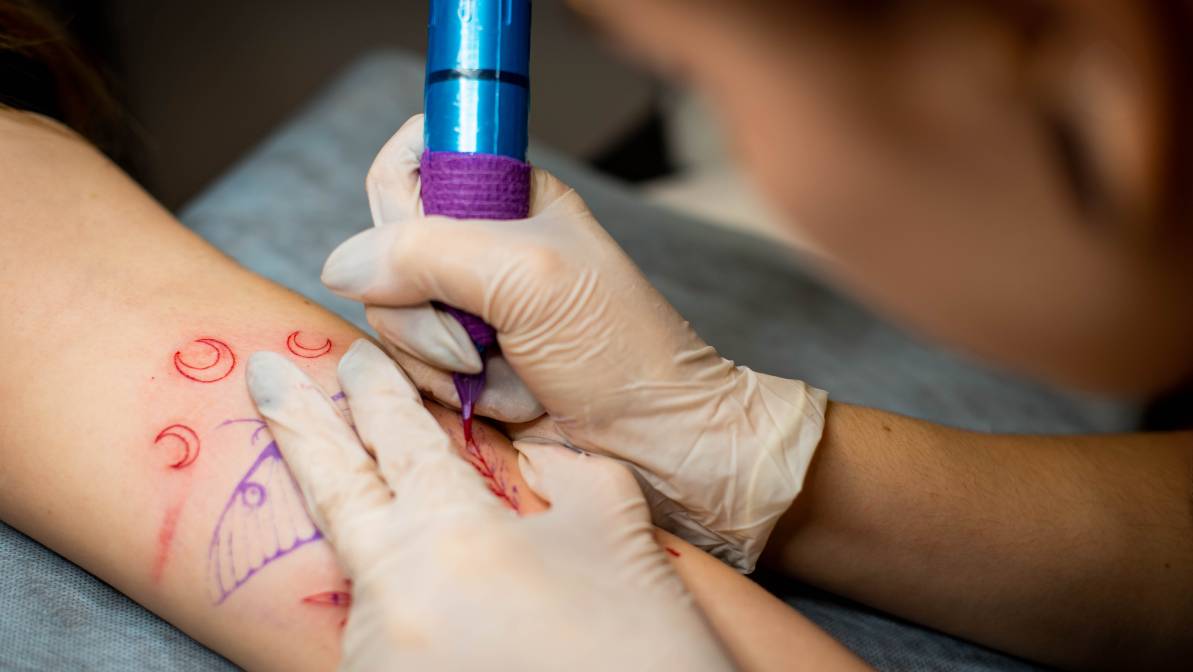
How much does a tattoo cost?
Read more
Related articles
